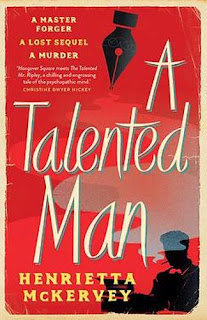A Talented Man – Henrietta McKervey
A Talented Man is set in the mid 1930s, where the world is on the brink of an unthinkable new world war and the formerly wealthy middle classes are starting to see a change in their fortunes. Ellis Spender is frustrated by his lack of success as a budding novelist and dissatisfied with his home circumstances. Formerly a well-off family – Ellis’s now dead father Sidney Spender a once renowned artist with a studio in Mayfair before his paintings went out of fashion – the family’s fortunes have dwindled. His mother still has some airs towards respectability but they now have lodgers instead of servants, and the house – like Sidney’s paintings – feels like a fading remnant of an older age.
It seems a suitable place then for Ellis’s uncle Freddie’s cases. A theatre ‘impressario’ from its golden age, Freddie has taken off for America leaving his belongings and debts with his sister Virginia, Ellis’s mother, storing them away in a dark dusty room. Among these artifacts and memorabilia are some letters of a rather intimate nature that a man called Winsome sent to his uncle Freddie and would like retrieved. Ellis manages to extort a large sum of money from the man that provides him with the means to take Janey, a young lady lodger he is obsessed with, out to have a good time on the town.
The money doesn’t go far of course and soon Ellis is contemplating what other money he can make from Freddie belongings and his associations with the theatrical world. His uncle has been a good friend of many glittering lights of the Lyceum; Gilbert and Sullivan, Henry Irving, Bram Stoker and had worked in a touring production of Dracula. His own family have an Irish background and close association with the Stokers and there is a great deal of correspondence between them. Some of that correspondence refers to a sequel to Dracula that Stoker abandoned and destroyed and it appeals to Ellis’s nature as a writer and his ability to mimic signatures (something that got him into trouble before) to embark on an ambitious but risky project.
It’s a while before you get to this point but you can see the direction it is heading. McKervey takes the time however to develop various quirks and twists in Ellis’s nature, his obsession with Janey, his lack of success as a writer, and a particular kick he seems to get out of using his talent to deceive people. There are also lots of little incidental but significant details in the family background and the progression of the road to war that provoke interest and speculation and provide a credible basis for what follows. It’s in this respect that McKervey really comes closest to Patricia Highsmith, the absolute master of delving into the mind of the accidental criminal. And what follows also lives up fully to the early developments, as events inevitably escalate and head down some paths that a talented criminal mind might not anticipate but must be able to see through to their dark conclusion.




Comments
Post a Comment